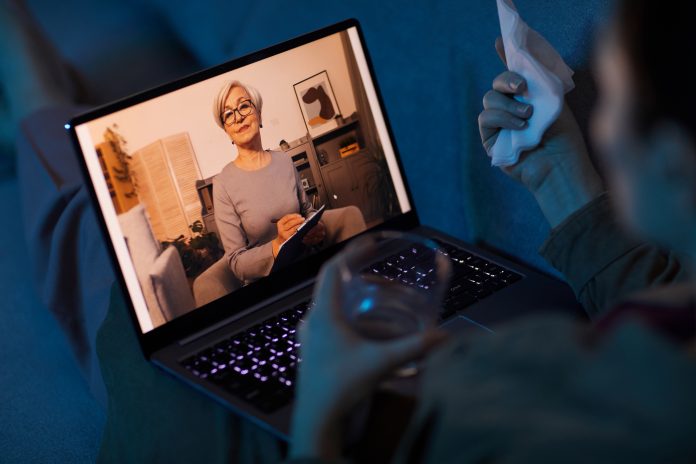Tim Barker, CEO at Kooth discusses the crucial role digital solutions will play in the post-pandemic recovery, particularly regarding mental health
Mental health has become one of the most defining global and social challenges of our time. In fact, according to the Centre for Mental Health, as a direct consequence of COVID-19 up to 10 million people in England alone may need support for their mental health.(1) Furthermore, the World Health Organisation (WHO) forecasts that poor mental health will be the number one cause of mortality and morbidity globally by 2030.(2)
Kooth’s own anonymous data and insights affirm the findings of the Centre for Mental Health and the WHO. In the Kooth Pulse 2021: The state of the nation’s mental health report, an 89% upsurge in the use of Kooth’s digital mental health platform by adults and an increase of 42% for children and young people was revealed. And some hard facts surrounding the presenting issues in both children and young people (CYP) and adults using its platform were unearthed.(3) This included a 27% increase in Kooth’s under 18 population users presenting with self-harm in the past year and a 39% increase in those presenting with suicidal thoughts versus last year. And across the adult user population a 23% increase in self-harm and 35% in suicidal thoughts since FY2019 and a 40% increase in those adults in counselling that claim to have thoughts of being better off dead or hurting themselves nearly every day. These figures are staggering and potentially only show a proportion of those who need mental health support.
There can be no denying the fact that supporting people with their mental health and wellbeing has never been more pertinent. However, more often than not in the UK, the responsibility for the continuous exponential rise in mental health needs, and providing the services and solutions, lies primarily in the hands of the NHS, Public Health England and Local Authorities. Organisations that have felt the heat of the global pandemic at a higher rate than others.
Which is why, now more than ever, as a nation, professionals, organisations, and citizens, we must work together to support the NHS and other public service and government departments to create a positive mental health ecosystem that addresses the needs of the whole nation.
An acceleration towards digital mental health solutions and services
As the UK enters its post-pandemic recovery and resilience building, there must be a renewed focus on creating and enabling a more mentally healthy UK. And just like the UK economy, this is where technological innovation and the increasingly digitally connected world plays its role.
One of the key findings and take outs from the Kooth Pulse 2021 report was an increase in the need for services that can help everyone adapt to a fundamental change in their daily lives and routine. During the pandemic, the nation adapted to a more home-based life, and there was an even heavier reliance on technology further accelerating the switch towards digitally based mental health support that is accessible 24/7.
It perhaps wasn’t a huge surprise to Kooth, as a digital mental health platform, it was born digital way back in 2001. However, the pandemic has accelerated the use of, and need for, more digital services within the NHS. In fact, according to a study from the Nuffield Trust, the COVID-19 pandemic has resulted in the rapid adoption of digital technology in the NHS and significant changes in the delivery of services more widely – to free up space and capacity in acute hospitals, enable remote working and reduce the risk of infection transmission in NHS settings.(4) Primary care, in particular, has seen a huge increase in remote appointments. So, it’s not just mental health services that have turned to digital solutions and technology for help.
However, when it comes to mental health, Sir Norman Lamb, Chair of the Kooth Advisory Board believes that “Digital mental health platforms are now providing necessary and vital support to the NHS to address the increase in demand for mental health support, the workforce shortages in the health sector, and the digital wants and needs of our population, widening accessibility to effective digital mental health services and offering access to high-quality interventions has been and continues to be, vital.” Sir Norman initially joined Kooth in 2019 with a keen interest in the role integrative digital mental health care could play to improve the mental health of citizens across the globe. This has certainly been accelerated during the pandemic.
This can be evidenced in the success of the rollout of Qwell (Kooth’s adult service) in Bradford. Earlier this year Public Health England invited applications for the Prevention and Promotion Fund for Better Mental Health. One of the key reasons for choosing Kooth was its ability to provide real-time and relevant insights into the mental health of the population in Bradford, along with its ability to offer early “pre-threshold” access to support and services. Since the Qwell went live in Bradford last September the service has been well received by statutory and VCS stakeholders within Health and Social Care. And it was referenced as an example of Bradford’s COVID-19 response plan as a prime example of a successful and effective out of hours digital mental health support.(5)
The Future of Mental Health Care
As we adapt to the new world and the fallout from the pandemic, the imperative is to continue to ensure that digital services such as Kooth are embedded within the traditional pathways, and wider support structures, of NHS mental health care. After all, to address the mental health and wellbeing needs of the nation, choice and diversity in how people access mental health support must be embraced. There’s no ‘one size fits all’ approach to care but the role digital can, and has played, in supporting the nation’s mental health during a time of need is clear. As trusted and proven partners, the NHS and Kooth are continuing to work together to address the mental health needs of UK citizens outside of the clinic, or the therapy room – providing support when and where it is needed.
Kooth is also well-placed to continue to grow and adapt with the NHS to meet the upcoming structural changes. It has exceptional local relationships across primary care, NHS providers and NHS commissioning systems, and understands the value it can add to help reduce costs and improve outcomes across the mental health pathway.
And as Kooth lives for insights and data – it will constantly strive to develop and analyse the evidence base for its services and online therapy. As an NHS-commissioned service to provide mental health early intervention and prevention support across the country, Kooth will continue to use its anonymous data to provide a barometer into the issues that are on the rise within the wider population. Ensuring that it plays its part in enabling and creating a mentally healthier UK.
About Kooth:
Kooth is the longest established digital mental health provider in the UK and it was ‘born digital.’ Established in 2001 by Elaine Bousfield – then known as XenZone – has assembled the very best team with a wide variety of skills – clinical, technical and finance – to tackle this global challenge by democratising access to effective digital mental health care and making it available to all.
Twenty years’ later Kooth is a free, safe and anonymous digital counselling and support service, and the only digital mental health provider to hold a UK-wide accreditation from the British Association of Counselling and Psychotherapy (BACP). It is currently commissioned across 90% of NHS England and large parts of Wales, and most recently with two regions in Scotland (Aberdeenshire and The Borders). The platform is autonomous but aligns closely with the NHS Thrive Framework. To date it has been accessed by over 526,000 children and young people, and 85,000 adults, and has an average of over 4,000 logins every day. And it is continuously innovating technically.
To find out more about how Kooth is providing support and partnering with the NHS and other government organisations, contact us on: ask@kooth.com
References
- https://www.centreformentalhealth.org.uk/news/10-million-people-england-may-need-support-their-mental-health-result-pandemic-says-centre-mental-health
- WHO, (2011). Global burden of mental disorders and the need for a comprehensive, coordinated response from health and social sectors at the country level: https://www.mentalhealth.org.uk/statistics/mental-health-statistics-global-and-nationwide-costs
- The Kooth Pulse 2021 report published on 11 May examines the data from April 2020 to March 2021 (NHS FY2020) from 192,000+ service users, insight from leading experts, and third-party research.
- https://www.nuffieldtrust.org.uk/files/2020-08/the-impact-of-covid-19-on-the-use-of-digital-technology-in-the-nhs-web-2.pdf
- https://jsna.bradford.gov.uk/documents/Mental%20wellbeing/01%20Mental%20Health%20Needs%20Assessment/COVID19%20Mental%20Health%20Needs%20Assessment%20-%20Stage%203%20Final%20report%20-%20July%202020.pdf
Please note: This is a commercial profile











